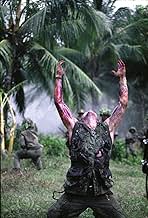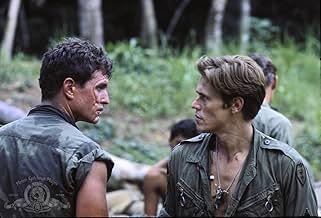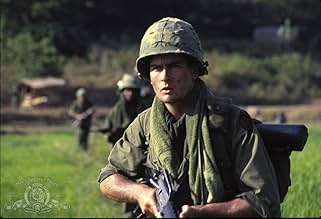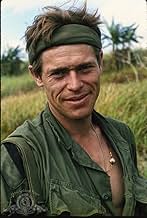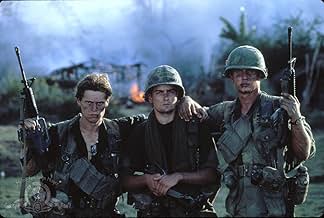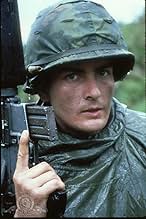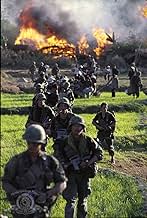Ein junger Rekrut in Vietnam gerät in eine moralische Krise, als er sich mit den Schrecken des Krieges und der Doppelnatur des Menschen konfrontiert sieht.Ein junger Rekrut in Vietnam gerät in eine moralische Krise, als er sich mit den Schrecken des Krieges und der Doppelnatur des Menschen konfrontiert sieht.Ein junger Rekrut in Vietnam gerät in eine moralische Krise, als er sich mit den Schrecken des Krieges und der Doppelnatur des Menschen konfrontiert sieht.
- 4 Oscars gewonnen
- 24 Gewinne & 16 Nominierungen insgesamt
Zusammenfassung
Reviewers say 'Platoon' is acclaimed for its realistic Vietnam War portrayal, highlighting soldiers' moral and psychological struggles. Oliver Stone's veteran experience enhances authenticity. The film is lauded for its gritty style and strong performances by Willem Dafoe and Tom Berenger. However, some critics argue it oversimplifies moral issues and lacks historical accuracy. Its anti-war message is both praised and criticized for being simplistic and propagandistic. Despite mixed views on artistic merit, 'Platoon' is recognized for its emotional impact and resonance.
Empfohlene Bewertungen
It's September 1967, and Chris (Charlie Sheen) has just arrived in Vietnam. He is sheltered and his father and grandfather fought in the military. As the new guy, nobody cares to be his friend. Lt. Wolfe (Mark Moses) is a weak ineffective leader. His men are divided in two. Some are followers of the cruel Sgt. Barnes (Tom Berenger). Others are followers of the humane Sgt. Elias (Willem Dafoe). In the end, Barnes and Elias are in a struggle for Chris' soul.
This is the quintessential Vietnam war movie. Oliver Stone has recreated the jungle combat and placed a morality tale in the middle of it. It is possibly Charlie Sheen's greatest performance. His innocence at the beginning evolves into a grizzled veteran fighter. The combat is so realistic, and the story is so compelling. It is a must see for all movie goers.
This is the quintessential Vietnam war movie. Oliver Stone has recreated the jungle combat and placed a morality tale in the middle of it. It is possibly Charlie Sheen's greatest performance. His innocence at the beginning evolves into a grizzled veteran fighter. The combat is so realistic, and the story is so compelling. It is a must see for all movie goers.
Many great war films of the Vietnam conflict are centered around these themes of blurred morality and the uselessness of war, and Oliver Stone's Platoon is among the most well known. Stone, who wrote and directed the film and also served as an infantryman in Vietnam, first rose to fame for his war films that dramatized the infamous Cold War conflict. The main premise of his magnum opus are the inner conflicts within US forces deployed to southeast Asia, rather than the actual physical conflicts between them and the Communist-allied Vietnamese forces. More broadly, Platoon analyzes the "duality of man" concept that has been studied in numerous other works, from fellow Vietnam War films like Full Metal Jacket (1987) and Apocalypse Now (1979), all the way back to the latter's source material and inspiration in Joseph Conrad's Heart of Darkness.
Platoon focuses on the moral decay of soldiers in American units, and how this contributes to their inability to fight their Vietnamese enemies. Charlie Sheen sums up this theme with his on-the-nose voiceover, "We did not fight the enemy, we fought ourselves... and the enemy was in us."
Vietnam War-movies tend to be even harder to watch than most war flicks, as the lines between the "heroes" and "villains" are blurred more than in any other dramatized period of warfare in recent human history. In wars like World War II, which are widely known for being as black and white as military conflicts have become, the contrasting features between the heroic forces we are meant to root for and their opposing enemy platoons are well defined. That is almost never the case with the United States-North Vietnamese/Vietcong conflict in Vietnam during the overarching Cold War.
That is not to say that most wars throughout human history have not been many shades of grey, with the winners and losers not always corresponding with the righteous and evil. But because of the guerrilla nature and infamous legacy of the Vietnam War itself - namely, the immense public protest against American involvement - the Vietnam War remains by far the most unpopular war in modern American history. With that said, most of the film is fantastic, from the aforementioned narrative to the grim lightning of the southeast Asian jungles that emphasize the film's tone, to the poignant, melancholic score.
Platoon focuses on the moral decay of soldiers in American units, and how this contributes to their inability to fight their Vietnamese enemies. Charlie Sheen sums up this theme with his on-the-nose voiceover, "We did not fight the enemy, we fought ourselves... and the enemy was in us."
Vietnam War-movies tend to be even harder to watch than most war flicks, as the lines between the "heroes" and "villains" are blurred more than in any other dramatized period of warfare in recent human history. In wars like World War II, which are widely known for being as black and white as military conflicts have become, the contrasting features between the heroic forces we are meant to root for and their opposing enemy platoons are well defined. That is almost never the case with the United States-North Vietnamese/Vietcong conflict in Vietnam during the overarching Cold War.
That is not to say that most wars throughout human history have not been many shades of grey, with the winners and losers not always corresponding with the righteous and evil. But because of the guerrilla nature and infamous legacy of the Vietnam War itself - namely, the immense public protest against American involvement - the Vietnam War remains by far the most unpopular war in modern American history. With that said, most of the film is fantastic, from the aforementioned narrative to the grim lightning of the southeast Asian jungles that emphasize the film's tone, to the poignant, melancholic score.
At the height of the Vietnam War, America's teens are drafted into the war effort to find themselves in the middle of hell. One such young man is Chris Taylor. He is placed in a squadron where two sergeants have different approaches to the war Elias is more about surviving without being brutal or cruel, whereas Barnes is crueller, more ruthless and more violent. During the course of his term, Taylor's very soul is torn between the two men as he deals with what he must do.
The first film in Oliver Stone's unofficial trilogy is arguably the best of the three. The basic story not only shows us what the war was like for those serving but also how the different personalities come out of those involved in it. As we follow Taylor we see him change as he is influenced by those around him and by his situation. It makes for an uncomfortable film but one that's worth watching. It's certainly a better war movie than things like Wild Geese or The Dirty Dozen, simply because it's a little more real to what happens than those ones.
Charlie Sheen has never been better than when he's acting for Stone. Here he gives one of his best ever performances as the innocent who is changed. Willem Dafoe is a great actor and here is no different he also gives us one of the film's most enduring images so I'm a little biased. Berenger is another one for whom it's hard to think of a higher point reached than when he did this film. He is brutal and ruthless but he makes us support him in a strange way. The support cast are all good and contains a few famous faces (John C McGinley, Whitaker, Depp) however this is really a three man show.
Overall this is brutal and violent with no happy ending. At the end of the day isn't that what a war film should be?
The first film in Oliver Stone's unofficial trilogy is arguably the best of the three. The basic story not only shows us what the war was like for those serving but also how the different personalities come out of those involved in it. As we follow Taylor we see him change as he is influenced by those around him and by his situation. It makes for an uncomfortable film but one that's worth watching. It's certainly a better war movie than things like Wild Geese or The Dirty Dozen, simply because it's a little more real to what happens than those ones.
Charlie Sheen has never been better than when he's acting for Stone. Here he gives one of his best ever performances as the innocent who is changed. Willem Dafoe is a great actor and here is no different he also gives us one of the film's most enduring images so I'm a little biased. Berenger is another one for whom it's hard to think of a higher point reached than when he did this film. He is brutal and ruthless but he makes us support him in a strange way. The support cast are all good and contains a few famous faces (John C McGinley, Whitaker, Depp) however this is really a three man show.
Overall this is brutal and violent with no happy ending. At the end of the day isn't that what a war film should be?
This certainly rates as one of the best Vietnam films of all time. What I especially enjoyed was the realistic atmosphere of the film, entrenching the viewer into a world which seems surreal yet believable. Oliver Stone's real-life experience in Vietnam brought a gifted outlook to this film, one drawn by experience, not common Hollywood conventions. While this proved be a lesser film to the equally amazing Full Metal Jacket, it was not by much. The performances by Tom Berenger, Willem Dafoe, Charlie Sheen and John C. McGinley were exceptional, capturing the plight of the tortured soldiers.
The 1980s in general and the mid 1980s in particular aren't highly regarded where pop culture is concerned , this is most especially true in cinema where films seemed to be written around their soundtrack in much the same way as Hollywood movies nowadays seem to be written around their special effects . PLATOON is one of the very few films from that period that has an emotional impact , an impact that it still retains while watching it in 2003.
Everyone else seems to have mentioned what makes PLATOON a classic anti-war ( Note it's anti-war , not anti American or anti soldier ) movie along with being a classic movie , so I won't go over old ground except to say THAT death scene is up there with all the other tear jerking scenes from 20th century cinema , don't be ashamed to say you cried
If PLATOON has a flaw it's in its duality , there's the good Sarge/bad Sarge , good officer/bad officer , good white guy/bad white guy , good black guy/bad black boy etc which is maybe a bit clichéd and possibly leads me to believe Stone is making an excuse/reason that the Americans lost in Vietnam because that spent so much fighting each other rather than the VC ( Though I do concede I'm possibly misinterpreting that as an excuse or even a reason since no one will confuse the politics of Stone with the politics of John Wayne ) while Taylor's character comes across as being more of a literary device rather than a real human being , but these are minor flaws
It's a shame to see war films from the last few years devoid of scathing anti-war sentiments like the ones seen here . PLATOON screams at you " War is hell and whatever the rights and wrongs of conflict you need a bloody good reason to wage war . Vietnam wasn't a good enough reason to sacrifice human lives "
Everyone else seems to have mentioned what makes PLATOON a classic anti-war ( Note it's anti-war , not anti American or anti soldier ) movie along with being a classic movie , so I won't go over old ground except to say THAT death scene is up there with all the other tear jerking scenes from 20th century cinema , don't be ashamed to say you cried
If PLATOON has a flaw it's in its duality , there's the good Sarge/bad Sarge , good officer/bad officer , good white guy/bad white guy , good black guy/bad black boy etc which is maybe a bit clichéd and possibly leads me to believe Stone is making an excuse/reason that the Americans lost in Vietnam because that spent so much fighting each other rather than the VC ( Though I do concede I'm possibly misinterpreting that as an excuse or even a reason since no one will confuse the politics of Stone with the politics of John Wayne ) while Taylor's character comes across as being more of a literary device rather than a real human being , but these are minor flaws
It's a shame to see war films from the last few years devoid of scathing anti-war sentiments like the ones seen here . PLATOON screams at you " War is hell and whatever the rights and wrongs of conflict you need a bloody good reason to wage war . Vietnam wasn't a good enough reason to sacrifice human lives "
Oscars Best Picture Winners, Ranked
Oscars Best Picture Winners, Ranked
See the complete list of Oscars Best Picture winners, ranked by IMDb ratings.
Wusstest du schon
- WissenswertesAccording to Oliver Stone, he intentionally cast Tom Berenger and Willem Dafoe against type. Berenger was mostly famous for playing good guys, while Dafoe had primarily played villains up until then. Both men received Oscar nominations for their work.
- PatzerWhen the men are playing cards, one of the men is looking at a Playboy from March 1971, despite the film taking place in 1967.
- Zitate
[Refering to Vietnam]
Chris Taylor: Somebody once wrote, "Hell is the impossibility of reason." That's what this place feels like. Hell. I hate it already, and it's only been a week. Some goddamn week.
- Alternative VersionenTV version has much of its dialogue redubbed and shots refilmed, replacing such lines as "He thinks he's Jesus F---in' Christ!" with "He thinks he's George Freakin' Washington!"
- VerbindungenEdited into A Tour of the Inferno: Revisiting 'Platoon' (2001)
- SoundtracksAdagio for Strings
Written by Samuel Barber
Arranged and Conducted by Georges Delerue
Used by arrangement with G. Schirmer, Inc.
Top-Auswahl
Melde dich zum Bewerten an und greife auf die Watchlist für personalisierte Empfehlungen zu.
Details
- Erscheinungsdatum
- Herkunftsländer
- Offizieller Standort
- Sprachen
- Auch bekannt als
- Pelotón
- Drehorte
- Produktionsfirmen
- Weitere beteiligte Unternehmen bei IMDbPro anzeigen
Box Office
- Budget
- 6.000.000 $ (geschätzt)
- Bruttoertrag in den USA und Kanada
- 138.530.565 $
- Eröffnungswochenende in den USA und in Kanada
- 241.080 $
- 21. Dez. 1986
- Weltweiter Bruttoertrag
- 138.546.255 $
- Laufzeit
- 2 Std.(120 min)
- Farbe
- Sound-Mix
- Seitenverhältnis
- 1.85 : 1
Zu dieser Seite beitragen
Bearbeitung vorschlagen oder fehlenden Inhalt hinzufügen







